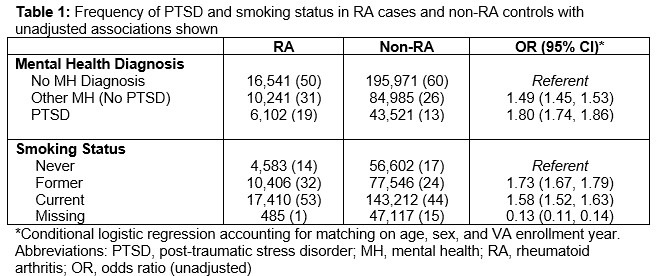Session Information
Session Type: Poster Session A
Session Time: 10:30AM-12:30PM
Background/Purpose: Post-traumatic stress disorder (PTSD) is associated with increased systemic inflammation that may increase the risk of developing autoimmune disorders such as rheumatoid arthritis (RA). The prevalence of cigarette smoking, an established risk factor in RA, is substantially higher in patients with PTSD than in the general population. We aimed to quantify the association between PTSD and the risk of developing RA in U.S. veterans, examining whether this association is confounded or modified by smoking.
Methods: We conducted a nested, case-control study using national Veteran Health Administration data from 2006-2019, identifying patients with incident RA (≥2 diagnostic codes, rheumatologist diagnosis, positive autoantibody or DMARD fill, plus ≥365 days in VA care before a DMARD fill or RA ICD code). Cases were matched to non-RA controls on the date the RA algorithm was fulfilled, at a ratio up to 1:10 by age, sex and year of VA enrollment. PTSD and other mental health disorders (OMH; i.e., bipolar disorder, depression, anxiety and substance use) were identified retrospectively and defined by the presence of ≥2 ICD9/10 codes. Conditional multivariable logistic regression was used to examine the association of PTSD (± OMH) and OMH (without PTSD) with RA, adjusting for race, ethnicity, urban/rural residence, smoking status, and BMI and including an interaction term for RA status and smoking. Based on initial results, additional models were stratified by ever vs. never smoking status and included age, sex, and year of VA enrollment as covariates in addition to those noted. Separate models were used to examine associations in subgroups defined by sex and seropositivity status (RF and/or aCCP).
Results: Patients included in this analysis (n=357,361; n=32,884 with RA) had a mean age of 53 years, 87% were male, and 70% had ever smoked. Among RA cases, 76% were RF or aCCP positive. PTSD, OMH, and smoking were all more frequent in patients with RA than controls (Table 1). In multivariable analyses, there was evidence of a highly significant smoking-PTSD interaction (p< 0.001). In subsequent multivariable analyses stratified by ever smoking status, the association of PTSD (vs. no PTSD or OMH) with RA was higher in never smokers (aOR 1.54; 95% CI 1.41, 1.69) than ever smokers (aOR 1.20; 95% CI 1.16, 1.25). Similar associations, though lower in magnitude, were observed for OMH (Table 2). PTSD-related risk remained quantitatively higher in never vs. ever smokers in subgroups defined by sex and seropositivity with a higher risk observed for seronegative RA (Table 3).
Conclusion: In addition to validating prior reports demonstrating an increased risk of RA attributable to both PTSD and cigarette smoking, these results suggest that the relationship of PTSD with RA disease susceptibility is modified, rather than being confounded, by smoking status with a greater contribution to RA risk in never smokers. PTSD also appears to be more closely associated with the development of seronegative RA. These results highlight a complex relationship between PTSD and OMH with RA development and call for research into how mental health may influence the development of distinct RA phenotypes.
To cite this abstract in AMA style:
Coziahr K, Sayles H, Johnson T, Baker J, Roul P, Cannon G, Kunkel G, England B, Mikuls T. Effect Modification of Cigarette Smoking on the Relationship between Post Traumatic Stress Disorder and Rheumatoid Arthritis Risk [abstract]. Arthritis Rheumatol. 2025; 77 (suppl 9). https://acrabstracts.org/abstract/effect-modification-of-cigarette-smoking-on-the-relationship-between-post-traumatic-stress-disorder-and-rheumatoid-arthritis-risk/. Accessed .« Back to ACR Convergence 2025
ACR Meeting Abstracts - https://acrabstracts.org/abstract/effect-modification-of-cigarette-smoking-on-the-relationship-between-post-traumatic-stress-disorder-and-rheumatoid-arthritis-risk/


.gif)
.gif)